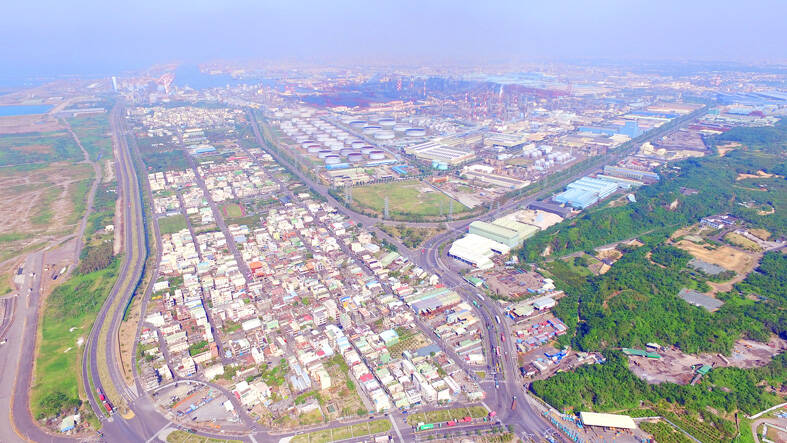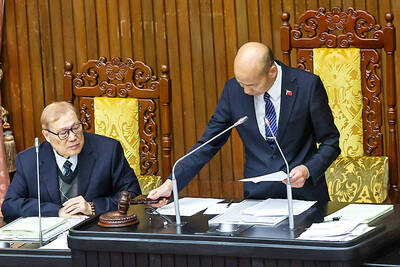The Executive Yuan yesterday approved a budget of NT$80 billion (US$2.55 billion) to relocate residents of Kaohsiung’s Dalinpu area (大林蒲) who have long been beset by industrial pollution.
The amended plan would cover housing for 5,850 eligible residents and other types of subsidies.
On hearing the announcement, Kaohsiung Mayor Chen Chi-mai (陳其邁) thanked the Cabinet for allowing the relocation plan to proceed.

Photo courtesy of the Kaohsiung City Government
“This came after many years of planning and pushing for action, with the relocation budget for Dalinpu escalating from the original NT$50 billion to NT$80 billion,” he said.
It would not be merely a relocation, but “we will help residents to upgrade their living conditions at their new places,” he added.
With NT$711 million for a new residency program, homeowners are to receive subsidies for new houses, non-homeowners would be accommodated at new social housing units for two years and low-income households would receive housing subsidies for three years.
Those who opt out of living in social housings will receive a subsidy of NT$100,000.
Dalinpu, in Siaogang District (小港), near the main port facilities, faced major pollution issues when government established the Siaogang Linhai Industrial Park (小港臨海工業區) in 1976.
As they were increasingly surrounded by oil refineries, petrochemical factories, power plants and steel mills, local residents faced worsening pollution and industrial accidents each year, prompting them to protests and push for relocation.
In 2016, then-premier Lin Chuan (林全) led Cabinet ministers in apologizing and initiated plans for the relocation. In 2019, then-premier Su Tseng-chang (蘇貞昌) approved a medium-to-long term plan for relocation.

DEFENDING DEMOCRACY: Taiwan shares the same values as those that fought in WWII, and nations must unite to halt the expansion of a new authoritarian bloc, Lai said The government yesterday held a commemoration ceremony for Victory in Europe (V-E) Day, joining the rest of the world for the first time to mark the anniversary of the end of World War II in Europe. Taiwan honoring V-E Day signifies “our growing connections with the international community,” President William Lai (賴清德) said at a reception in Taipei on the 80th anniversary of V-E Day. One of the major lessons of World War II is that “authoritarianism and aggression lead only to slaughter, tragedy and greater inequality,” Lai said. Even more importantly, the war also taught people that “those who cherish peace cannot

STEADFAST FRIEND: The bills encourage increased Taiwan-US engagement and address China’s distortion of UN Resolution 2758 to isolate Taiwan internationally The Presidential Office yesterday thanked the US House of Representatives for unanimously passing two Taiwan-related bills highlighting its solid support for Taiwan’s democracy and global participation, and for deepening bilateral relations. One of the bills, the Taiwan Assurance Implementation Act, requires the US Department of State to periodically review its guidelines for engagement with Taiwan, and report to the US Congress on the guidelines and plans to lift self-imposed limitations on US-Taiwan engagement. The other bill is the Taiwan International Solidarity Act, which clarifies that UN Resolution 2758 does not address the issue of the representation of Taiwan or its people in

The Philippines yesterday criticized a “high-risk” maneuver by a Chinese vessel near the disputed Scarborough Shoal (Huangyan Island, 黃岩島) in a rare incident involving warships from the two navies. The Scarborough Shoal — a triangular chain of reefs and rocks in the contested South China Sea — has been a flash point between the countries since China seized it from the Philippines in 2012. Taiwan also claims the shoal. Monday’s encounter took place approximately 11.8 nautical miles (22km) southeast” of the Scarborough Shoal, the Philippine military said, during ongoing US-Philippine military exercises that Beijing has criticized as destabilizing. “The Chinese frigate BN 554 was

LEISURE: The new law adds Confucius’ birthday, the anniversary of the Battle of Guningtou, Constitution Day and Little New Year as national holidays The Legislative Yuan yesterday passed new legislation adding four national holidays and making Workers’ Day a national holiday for all sectors. The Chinese Nationalist Party (KMT) and the Taiwan People’s Party used their combined majority in the legislature to push the jointly proposed draft through its third and final reading. This new law supersedes the existing regulations for the implementation of memorial days and state holidays, which are administered by the Ministry of the Interior. The new law recognizes Confucius’ birthday on Sept. 28, the anniversary of the Battle of Guningtou on Oct. 25, Constitution Day on Dec. 25 and “Little New Year,”